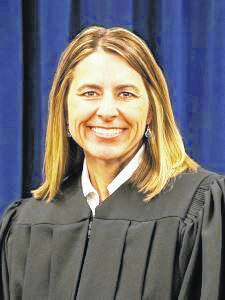
Judge Stacy M. Wall
Courtesy photo
TROY — The Mental Health docket of the Miami County Common Pleas Court has earned final certification from the Supreme Court of Ohio Commission on Specialized Dockets.
To receive the certification, a local court submits a detailed application, undergoes a visit and report on its practices, and provides specific program materials in response to certification standards that went into effect in January 2014.
Ohio Supreme Court Chief Justice Sharon L. Kennedy congratulated Judge Stacy M. Wall and the Miami County Common Pleas Mental Health Court for meeting the standards required for final certification.
“Specialized dockets offer an alternative to incarceration, and reflect a community’s belief in second chances,” Kennedy said. “They focus on people who are willing to work to overcome the personal challenges that led to their involvement in the justice system. The court and community partners work together to supervise treatment, training, and support, providing local solutions to local problems under leadership of the local court.”
Courts with specialized dockets address specific treatment needs of people who are charged with a variety of offenses using recommended best-practices that focus on offender accountability, behavior change and recovery. There are 258 certified dockets in Ohio courts with expertise in areas such as: drug and alcohol addiction; mental health; domestic violence; human trafficking; and veterans issues.
The certification standards provide a minimum level of uniform practices for specialized dockets throughout Ohio and allow local courts to innovate and tailor programs to meet their community’s needs and resources.
Wall started the Mental Health Court docket in seeing the need to assist and rehabilitate those who have a mental health diagnosis but had not received the proper treatment or medication, which resulted in criminal behaviors. Those participants in the Mental Health Court have seen Wall and the treatment team as a positive support rather than as a negative consequence of their behavior.
“On a daily basis, the majority of us have challenges, but those challenges can be somewhat simplistic when you think about it – how do we make the next appointment on time, how do we get our child to soccer practice, what is for dinner – when the participants may have the same questions, but the difference is they do not have the means nor someone they can rely on for help,” she said.
That is where the treatment team and the Court have become the blanket of support for many of the participants, finding transportation options, housing, medication, clothing, school supplies and most importantly, coping skills. One participant informed Wall the reason the Mental Health Court was different and truly helpful was because the court took the time to get to know each participant and treat them for their individual issues rather than seeing everyone the same.
“We all have daily struggles but when you take those struggles and compound it with a mental health diagnosis, no medication and no support system, those struggles become mountains the participant feels he just can’t climb. The Court is providing that path to learn to climb the hill before reaching the top of that mountain with the goal to not reoffend,” Wall said.
Multiple coping skills and lessons are presented at each court session from budgeting to nutrition to physical exercise as well as how to address the stigma associated with mental health.
The certification requirements include establishing eligibility requirements, evaluating effectiveness of the specialized docket, and assembling a treatment team to implement daily operations of the specialized docket. The team is headed by the specialized docket judge and can include licensed treatment providers, law enforcement, court personnel, and more.
The Commission on Specialized Dockets has 22 members to advise the Supreme Court and its staff regarding the statewide rules and uniform standards concerning specialized dockets in Ohio courts; the development and delivery of specialized docket services to Ohio courts; and the creation of training programs for judges and court personnel. The commission makes all decisions regarding final certification.


